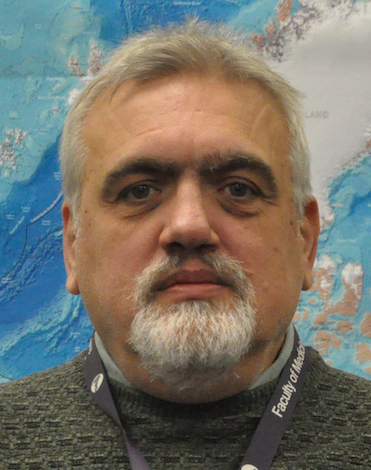Linking science, technology, and policy for a sustainable earth
People

Balazs M. Fekete, PhD
- Assistant Professor, Civil Engineering, CCNY
- The City College of New York
160 Convent Ave, Marshak Rm. 826
New York, NY 10031
- ResearchGate
- Github
- Email: bfekete@ccny.cuny.edu
- Phone: +1 212 650 6804
Dr. Fekete's scientific interests are largely driven by his strong computer skills. He has worked on various aspects of data management for hydrological analysis and modeling, developed highly specialized GIS tools for hydrological applications, and worked on software infrastructures to ease the hydrological model development and simplify the interface between models and input data. Early in his career, he developed an image processing system to process aerial video footage using video frame grabbers. He worked for a GIS company in Hungary and helped with the development of its GIS software. At the University of New Hampshire, he developed a specialized GIS for hydrological applications. This GIS software is part of a Global Hydrological Archive and Analysis System (GHAAS). While the GHAAS vision turned out to be too ambitious for a single developer, its 13-year-old design goals, including distributed data access, data format agnostic data management and meta database cataloging are becoming a reality in OGC standards.
Dr. Fekete is particularly interested in the development of modeling frameworks that separate the common modeling tasks (I/O, domain and time management, interfacing between domains, tasks parallelization, etc.) from the science code. He believes that future earth system models and applications will need a new data and model architecture that can utilize modern data services (over web interfaces) and distributed computing resources. Such a system will be necessary as the computational demand continues to grow as a result of operating models and applications at increasingly high spatial and temporal resolutions. In collaboration with Dr. Fekete, the University of New Hampshire team has developed two experimental modeling infrastructures as part of the GHAAS system that shows the potential of developing a model in unified modeling frameworks. Recent collaboration with the Geophysical Fluid Dynamics Laboratory to contribute biogeochemical processing capabilities to its earth system model allowed access to a different modeling framework.
In addition to computer infrastructure, Dr. Fekete’s hydrological research focuses on physical processes, including riverine flow, channel formation and hydrological data assimilations to incorporate discharge observations into river routing schemes as a means of providing the most accurate estimate of river discharge at any location. He has a special interest in stable isotope (deuterium and 18O) processes in the hydrological cycle. The stable isotope response in hydrological processes is often different from the water and energy balance and provides a different perspective to the hydrological cycle. A recently evolving opportunity to estimate the stable isotopic composition of the precipitation from the Tropospheric Emission Spectrometer onboard the Aura satellite potentially makes the application of stable isotopes at the large scale feasible.